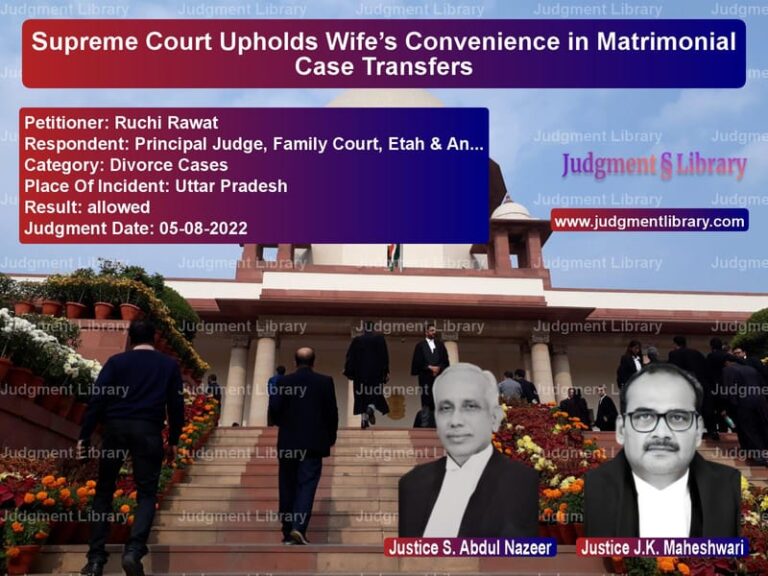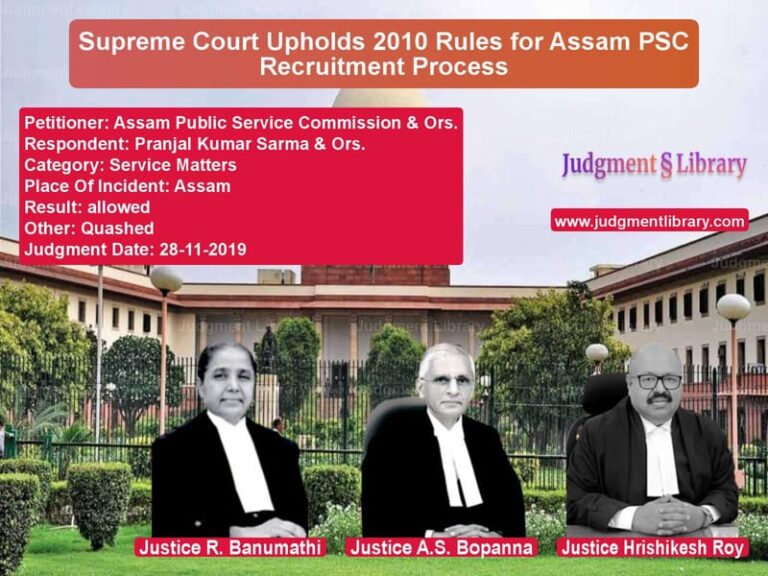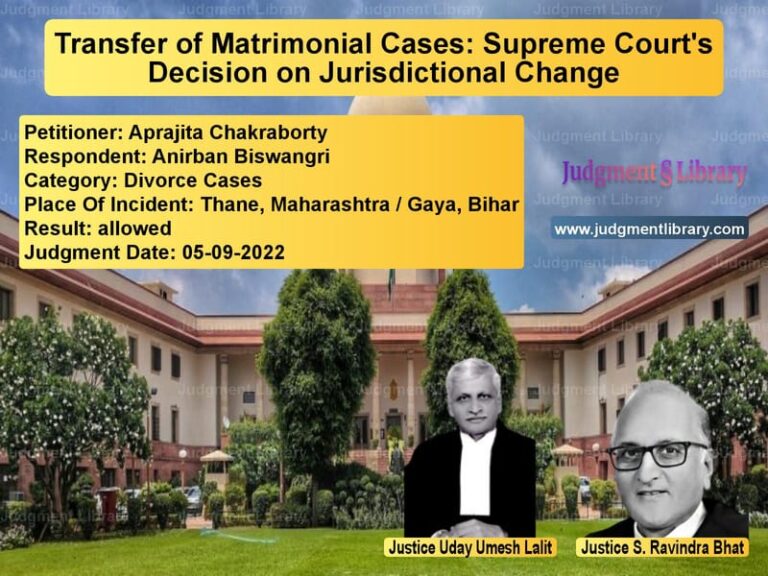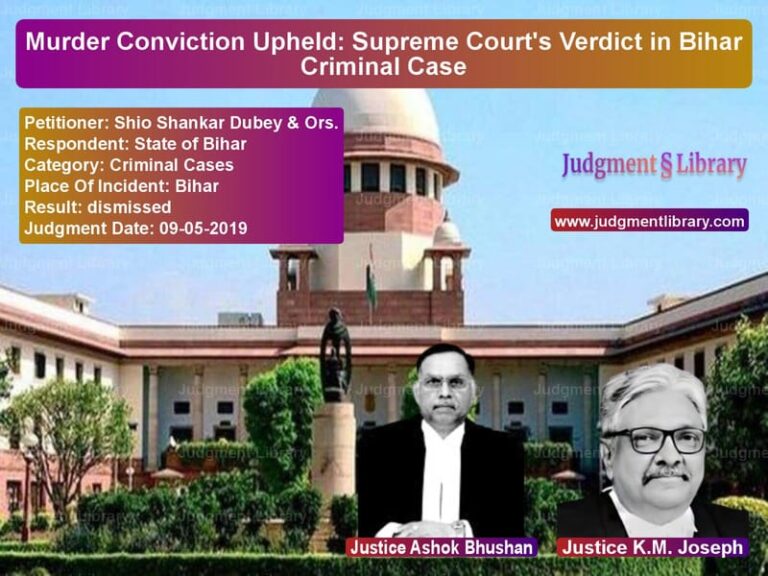Wakf Tribunal Jurisdiction Upheld: Supreme Court Rules in Property Dispute
The Supreme Court of India has ruled in favor of Mumtaz Yarud Dowla Wakf in a long-standing property dispute against M/S Badam Balakrishna Hotel Pvt. Ltd. & Others. The case highlights issues related to the jurisdiction of the Wakf Tribunal, the enforceability of eviction orders, and the legal maneuvering used to delay justice.
Background of the Case
The case involves a property owned by the appellant, Mumtaz Yarud Dowla Wakf, which was leased to respondent no. 2 for a period of 33 years. Upon the expiration of the lease, the appellant sought possession of the property. However, the respondents resisted eviction, citing an alleged oral extension of the lease and raising legal objections to the tribunal’s jurisdiction.
The appellant filed a suit before the Wakf Tribunal seeking ejectment, recovery of possession, and arrears of rent. The tribunal ruled in favor of the appellant on November 13, 2002, dismissing the respondents’ claims.
Legal Challenges and Delays
The respondents challenged the tribunal’s decree in the High Court, which dismissed their plea, affirming that they had no legal right to continue occupying the property. However, the respondents continued their legal battle, delaying execution proceedings.
In 2014, the appellant filed an execution petition. The respondents then raised a new objection—arguing that the Wakf Tribunal lacked jurisdiction, citing the Supreme Court’s ruling in Ramesh Gobindram v. Sugra Humayun Mirza Wakf. The Executing Court dismissed their objections, but the High Court reversed this decision, prompting the appellant to appeal to the Supreme Court.
Key Arguments by the Petitioner
The appellant’s counsel, led by senior advocates Dr. Abhishek Manu Singhvi and Huzefa Ahmadi, argued that:
- The respondents had never objected to the Wakf Tribunal’s jurisdiction during the trial or initial appeals.
- The Supreme Court had clarified the jurisdiction of the Wakf Tribunal in Rashid Wali Beg v. Farid Pindari, affirming that all disputes related to Wakf property fall within its jurisdiction.
- Allowing respondents to raise jurisdictional objections at the execution stage would unfairly reward their delaying tactics.
Key Arguments by the Respondents
The respondents, represented by senior advocate Shyam Divan, contended that:
- The Wakf Tribunal lacked jurisdiction to decide eviction matters, as per Ramesh Gobindram.
- Jurisdictional objections can be raised at any stage, even during execution.
- The High Court correctly ruled that the tribunal’s decree was void due to lack of jurisdiction.
Supreme Court’s Ruling
The Supreme Court overturned the High Court’s decision, holding that:
“The Wakf Tribunal has sufficient jurisdiction to try every suit pertaining to a Wakf or a Wakf property, notwithstanding the nature of relief concerned, except as mandated under the statute.”
It emphasized that jurisdictional objections must be raised at the earliest stage and cannot be used as a last-minute tactic to delay execution.
Key Legal Findings
- The respondents’ failure to challenge jurisdiction during trial and appeal barred them from doing so at the execution stage.
- The 2013 amendment to the Wakf Act removed the basis of the Ramesh Gobindram ruling, affirming the tribunal’s jurisdiction over eviction matters.
- The respondents’ legal tactics amounted to “approbate and reprobate” behavior—benefiting from the tribunal’s proceedings initially and then challenging its authority later.
Final Orders
The Supreme Court:
- Restored the Executing Court’s order dismissing the respondents’ objections.
- Directed the immediate execution of the eviction decree.
- Criticized the respondents for delaying justice through legal maneuvering.
Conclusion
This judgment reaffirms the authority of the Wakf Tribunal in property disputes and discourages litigants from using jurisdictional challenges as a delay tactic. The ruling ensures that landlords, especially religious trusts and Wakf boards, can enforce their rights without undue obstruction.
Petitioner Name: Mumtaz Yarud Dowla Wakf.Respondent Name: M/S Badam Balakrishna Hotel Pvt. Ltd. & Ors..Judgment By: Justice M. M. Sundresh, Justice Prashant Kumar Mishra.Place Of Incident: Hyderabad, Telangana.Judgment Date: 20-10-2023.
Don’t miss out on the full details! Download the complete judgment in PDF format below and gain valuable insights instantly!
Download Judgment: mumtaz-yarud-dowla-w-vs-ms-badam-balakrishn-supreme-court-of-india-judgment-dated-20-10-2023.pdf
Directly Download Judgment: Directly download this Judgment
See all petitions in Property Disputes
See all petitions in Succession and Wills
See all petitions in Specific Performance
See all petitions in Legal Malpractice
See all petitions in Contract Disputes
See all petitions in Judgment by M.M. Sundresh
See all petitions in Judgment by Prashant Kumar Mishra
See all petitions in allowed
See all petitions in Remanded
See all petitions in supreme court of India judgments October 2023
See all petitions in 2023 judgments
See all posts in Civil Cases Category
See all allowed petitions in Civil Cases Category
See all Dismissed petitions in Civil Cases Category
See all partially allowed petitions in Civil Cases Category







